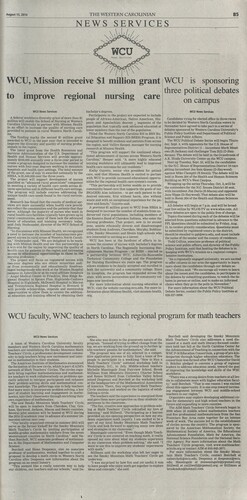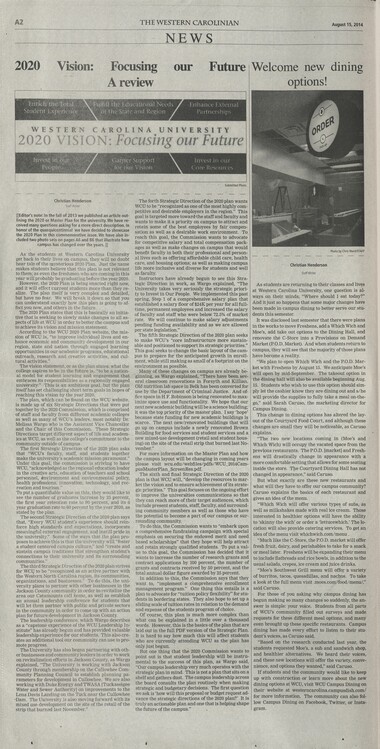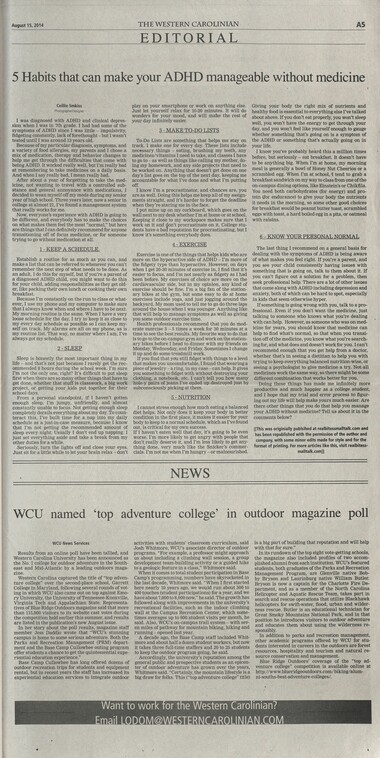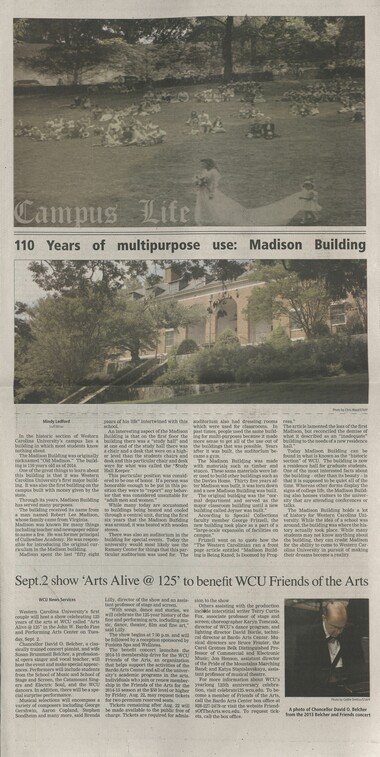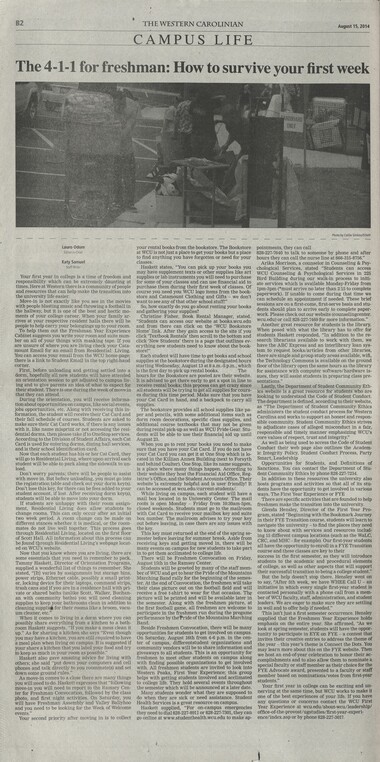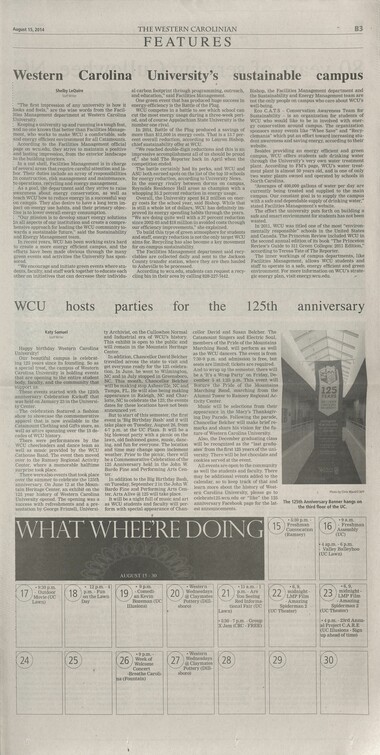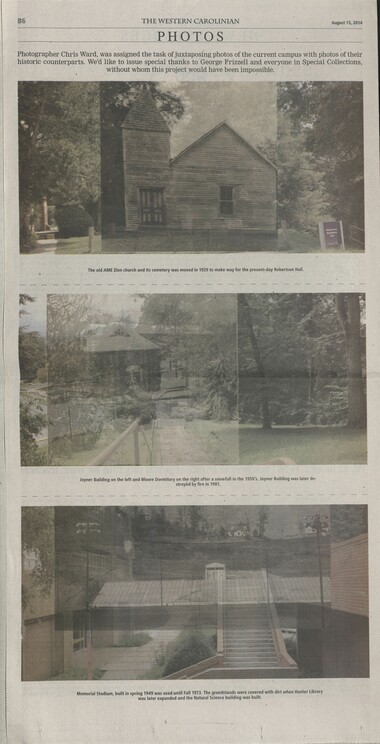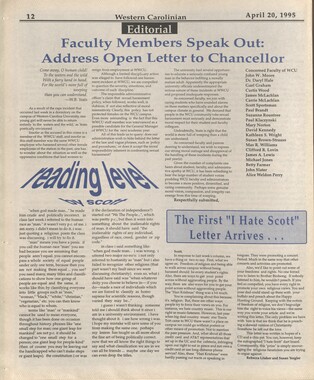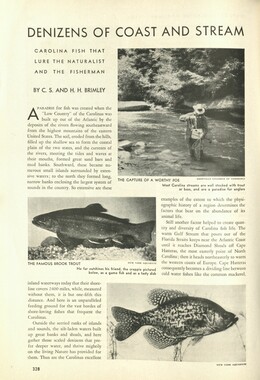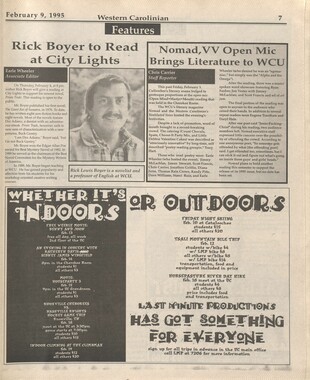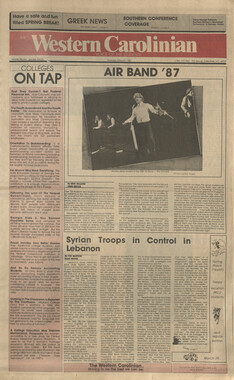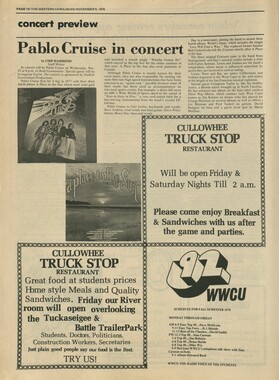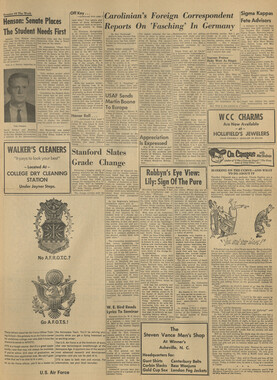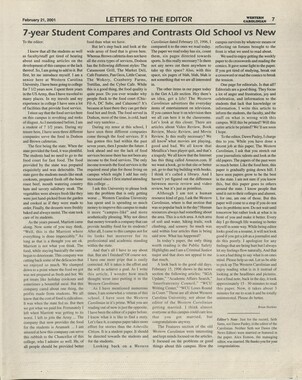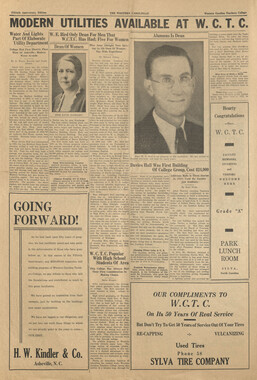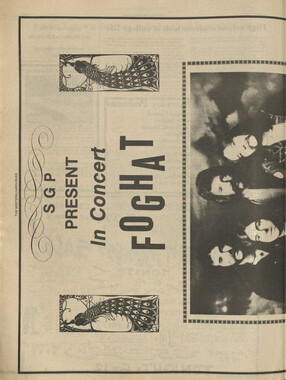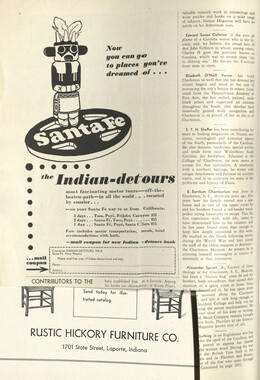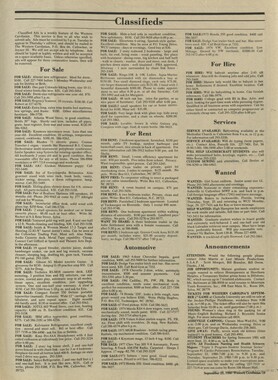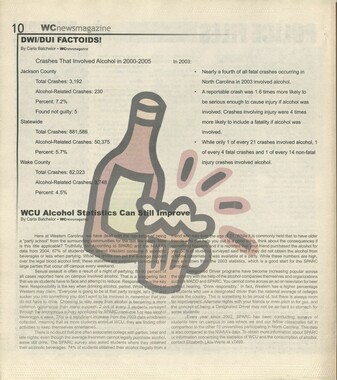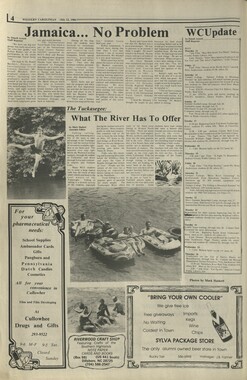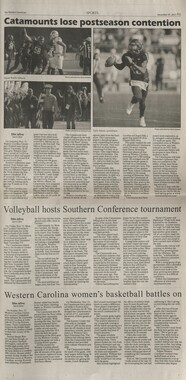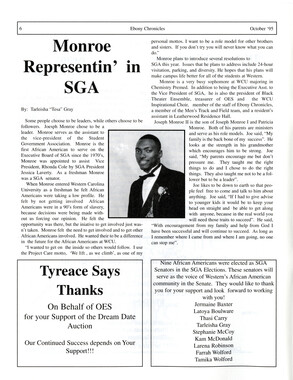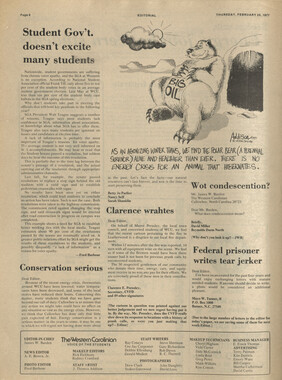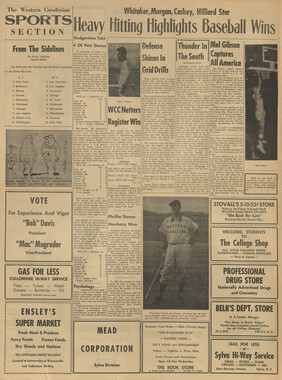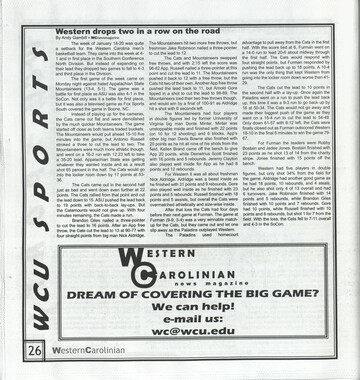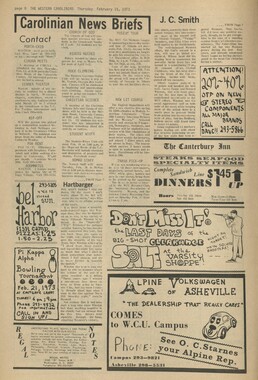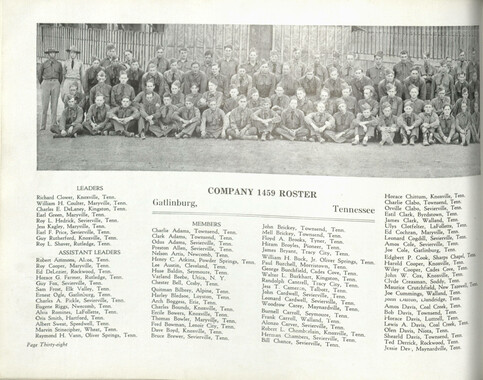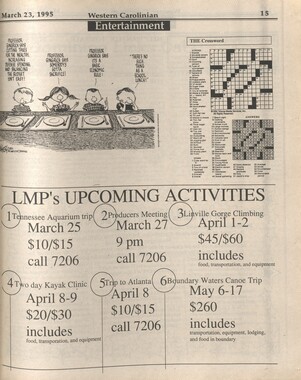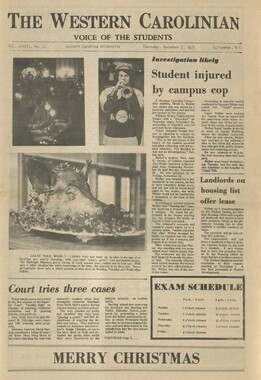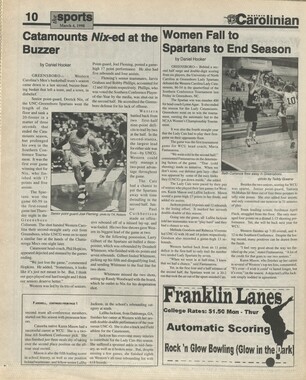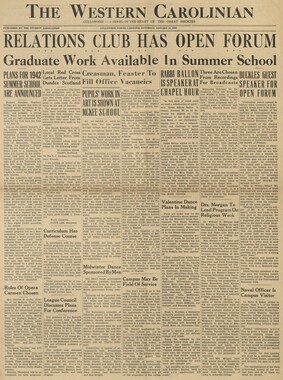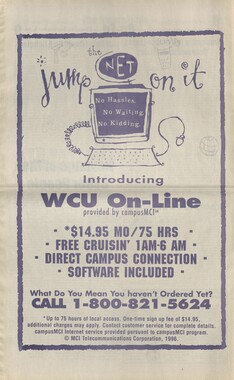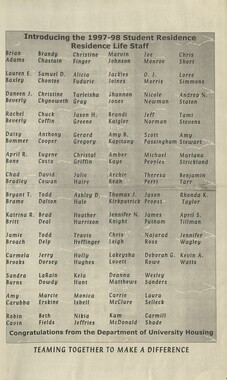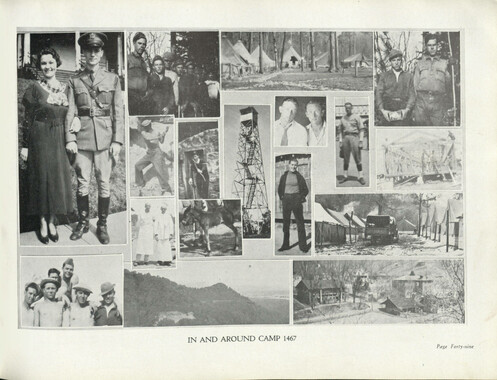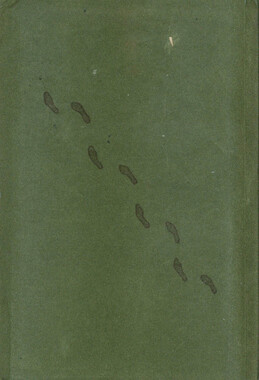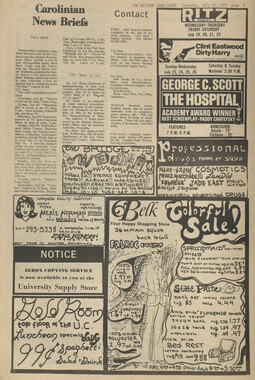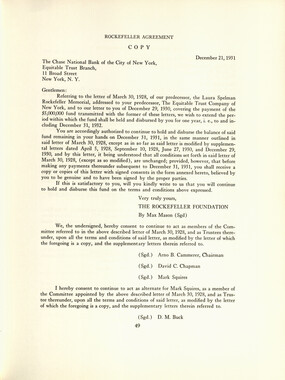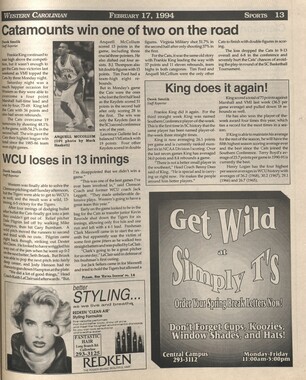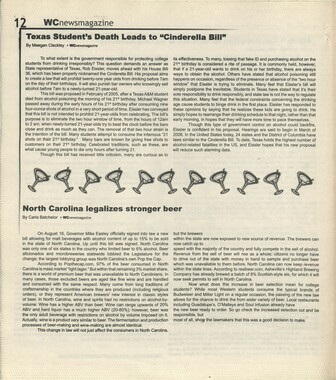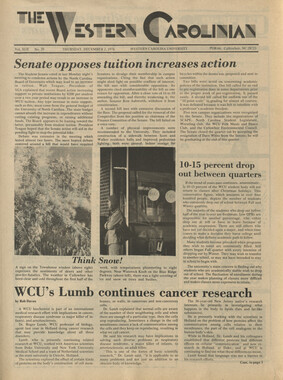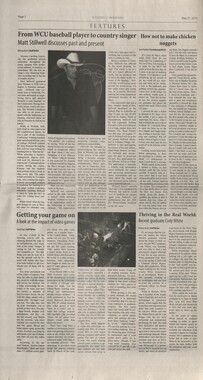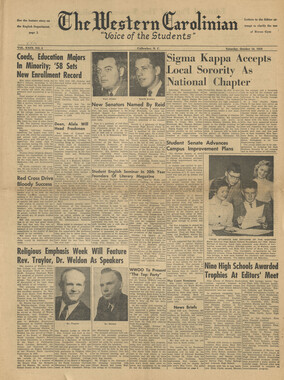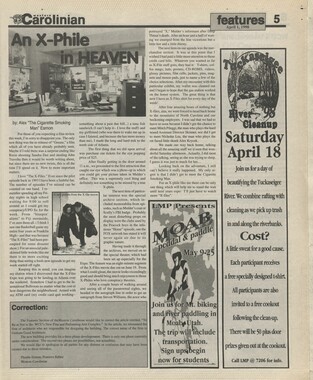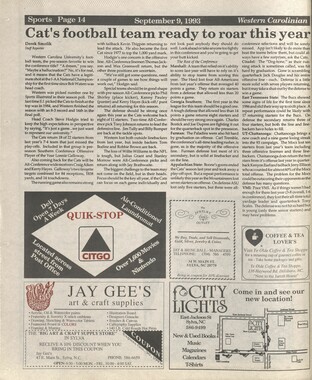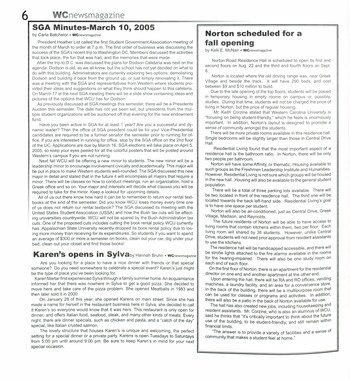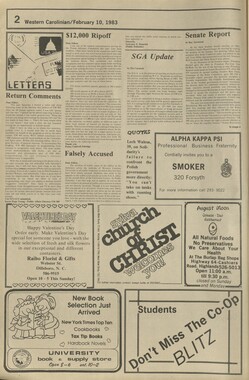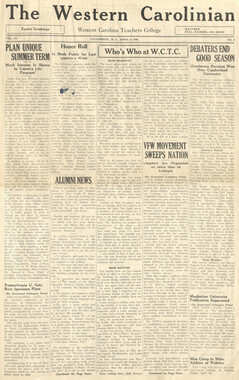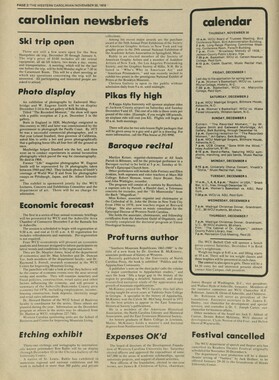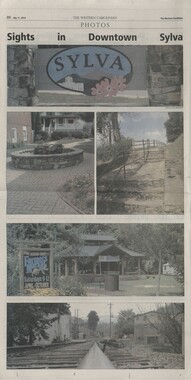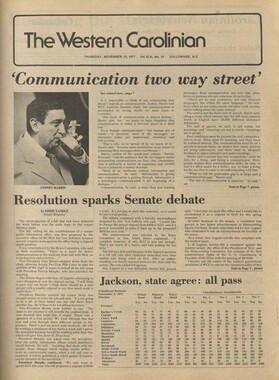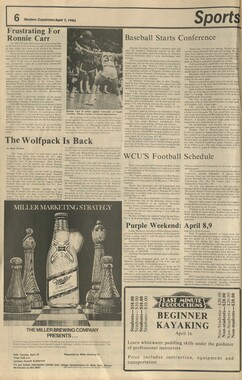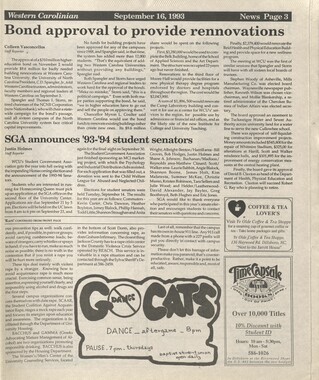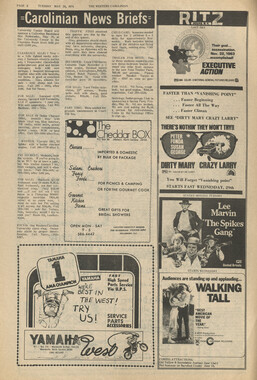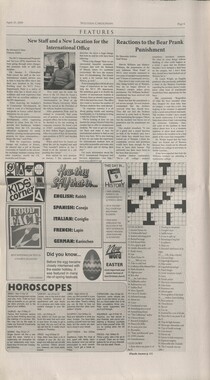Western Carolina University (21)
View all
- Canton Champion Fibre Company (2308)
- Cherokee Traditions (291)
- Civil War in Southern Appalachia (165)
- Craft Revival (1942)
- George Masa Collection (137)
- Great Smoky Mountains - A Park for America (2900)
- Highlights from Western Carolina University (422)
- Horace Kephart (973)
- Journeys Through Jackson (159)
- LGBTQIA+ Archive of Jackson County (85)
- Oral Histories of Western North Carolina (316)
- Picturing Appalachia (6797)
- Stories of Mountain Folk (413)
- Travel Western North Carolina (153)
- Western Carolina University Fine Art Museum Vitreograph Collection (129)
- Western Carolina University Herbarium (92)
- Western Carolina University: Making Memories (738)
- Western Carolina University Publications (2491)
- Western Carolina University Restricted Electronic Theses and Dissertations (146)
- Western North Carolina Regional Maps (71)
- World War II in Southern Appalachia (131)
University of North Carolina Asheville (6)
View all
- Allanstand Cottage Industries (62)
- Appalachian National Park Association (53)
- Bennett, Kelly, 1890-1974 (1463)
- Berry, Walter (76)
- Brasstown Carvers (40)
- Carver, George Washington, 1864?-1943 (26)
- Cathey, Joseph, 1803-1874 (1)
- Champion Fibre Company (233)
- Champion Paper and Fibre Company (297)
- Cherokee Indian Fair Association (16)
- Cherokee Language Program (22)
- Crowe, Amanda (40)
- Edmonston, Thomas Benton, 1842-1907 (7)
- Ensley, A. L. (Abraham Lincoln), 1865-1948 (275)
- Fromer, Irving Rhodes, 1913-1994 (70)
- George Butz (BFS 1907) (46)
- Goodrich, Frances Louisa (120)
- Grant, George Alexander, 1891-1964 (96)
- Heard, Marian Gladys (60)
- Kephart, Calvin, 1883-1969 (15)
- Kephart, Horace, 1862-1931 (313)
- Kephart, Laura, 1862-1954 (67)
- Laney, Gideon Thomas, 1889-1976 (439)
- Masa, George, 1881-1933 (61)
- McElhinney, William Julian, 1896-1953 (44)
- Niggli, Josephina, 1910-1983 (10)
- North Carolina Park Commission (105)
- Osborne, Kezia Stradley (9)
- Owens, Samuel Robert, 1918-1995 (11)
- Penland Weavers and Potters (36)
- Roberts, Vivienne (15)
- Roth, Albert, 1890-1974 (142)
- Schenck, Carl Alwin, 1868-1955 (1)
- Sherrill's Photography Studio (2565)
- Southern Highland Handicraft Guild (127)
- Southern Highlanders, Inc. (71)
- Stalcup, Jesse Bryson (46)
- Stearns, I. K. (213)
- Thompson, James Edward, 1880-1976 (226)
- United States. Indian Arts and Crafts Board (130)
- USFS (683)
- Vance, Zebulon Baird, 1830-1894 (1)
- Weaver, Zebulon, 1872-1948 (58)
- Western Carolina College (230)
- Western Carolina Teachers College (282)
- Western Carolina University (2008)
- Western Carolina University. Mountain Heritage Center (18)
- Whitman, Walt, 1819-1892 (10)
- Wilburn, Hiram Coleman, 1880-1967 (73)
- Williams, Isadora (3)
- Cain, Doreyl Ammons (0)
- Crittenden, Lorraine (0)
- Rhodes, Judy (0)
- Smith, Edward Clark (0)
- Appalachian Region, Southern (2940)
- Asheville (N.C.) (1944)
- Avery County (N.C.) (26)
- Blount County (Tenn.) (195)
- Buncombe County (N.C.) (1680)
- Cherokee County (N.C.) (283)
- Clay County (N.C.) (556)
- Graham County (N.C.) (238)
- Great Smoky Mountains National Park (N.C. and Tenn.) (525)
- Haywood County (N.C.) (3573)
- Henderson County (N.C.) (70)
- Jackson County (N.C.) (4919)
- Knox County (Tenn.) (35)
- Knoxville (Tenn.) (13)
- Lake Santeetlah (N.C.) (10)
- Macon County (N.C.) (421)
- Madison County (N.C.) (216)
- McDowell County (N.C.) (39)
- Mitchell County (N.C.) (135)
- Polk County (N.C.) (35)
- Qualla Boundary (982)
- Rutherford County (N.C.) (78)
- Swain County (N.C.) (2185)
- Transylvania County (N.C.) (270)
- Watauga County (N.C.) (12)
- Waynesville (N.C.) (86)
- Yancey County (N.C.) (72)
- Aerial Photographs (3)
- Aerial Views (60)
- Albums (books) (4)
- Articles (1)
- Artifacts (object Genre) (228)
- Bibliographies (1)
- Biography (general Genre) (2)
- Cards (information Artifacts) (38)
- Clippings (information Artifacts) (192)
- Copybooks (instructional Materials) (3)
- Crafts (art Genres) (622)
- Depictions (visual Works) (21)
- Design Drawings (1)
- Digital Moving Image Formats (2)
- Drawings (visual Works) (185)
- Envelopes (101)
- Exhibitions (events) (1)
- Facsimiles (reproductions) (1)
- Fiction (general Genre) (4)
- Financial Records (12)
- Fliers (printed Matter) (67)
- Glass Plate Negatives (381)
- Guidebooks (2)
- Internegatives (10)
- Interviews (817)
- Land Surveys (102)
- Letters (correspondence) (1045)
- Manuscripts (documents) (618)
- Maps (documents) (177)
- Memorandums (25)
- Minutes (administrative Records) (59)
- Negatives (photographs) (6090)
- Newsletters (1290)
- Newspapers (2)
- Notebooks (8)
- Occupation Currency (1)
- Paintings (visual Works) (1)
- Pen And Ink Drawings (1)
- Periodicals (193)
- Personal Narratives (10)
- Photographs (12976)
- Plans (maps) (1)
- Poetry (6)
- Portraits (4568)
- Postcards (329)
- Programs (documents) (181)
- Publications (documents) (2444)
- Questionnaires (65)
- Relief Prints (26)
- Sayings (literary Genre) (1)
- Scrapbooks (282)
- Sheet Music (2)
- Slides (photographs) (402)
- Songs (musical Compositions) (2)
- Sound Recordings (796)
- Specimens (92)
- Speeches (documents) (18)
- Tintypes (photographs) (8)
- Transcripts (324)
- Text Messages (0)
- A.L. Ensley Collection (275)
- Appalachian Industrial School Records (7)
- Appalachian National Park Association Records (336)
- Axley-Meroney Collection (2)
- Bayard Wootten Photograph Collection (20)
- Bethel Rural Community Organization Collection (7)
- Blumer Collection (5)
- C.W. Slagle Collection (20)
- Canton Area Historical Museum (2110)
- Carlos C. Campbell Collection (462)
- Cataloochee History Project (64)
- Cherokee Studies Collection (4)
- Daisy Dame Photograph Album (5)
- Daniel Boone VI Collection (1)
- Doris Ulmann Photograph Collection (112)
- Elizabeth H. Lasley Collection (1)
- Elizabeth Woolworth Szold Fleharty Collection (4)
- Frank Fry Collection (95)
- George Masa Collection (173)
- Gideon Laney Collection (452)
- Hazel Scarborough Collection (2)
- Hiram C. Wilburn Papers (28)
- Historic Photographs Collection (236)
- Horace Kephart Collection (861)
- Humbard Collection (33)
- Hunter and Weaver Families Collection (1)
- I. D. Blumenthal Collection (4)
- Isadora Williams Collection (4)
- Jesse Bryson Stalcup Collection (47)
- Jim Thompson Collection (224)
- John B. Battle Collection (7)
- John C. Campbell Folk School Records (80)
- John Parris Collection (6)
- Judaculla Rock project (2)
- Kelly Bennett Collection (1482)
- Love Family Papers (11)
- Major Wiley Parris Civil War Letters (3)
- Map Collection (12)
- McFee-Misemer Civil War Letters (34)
- Mountain Heritage Center Collection (4)
- Norburn - Robertson - Thomson Families Collection (44)
- Pauline Hood Collection (7)
- Pre-Guild Collection (2)
- Qualla Arts and Crafts Mutual Collection (12)
- R.A. Romanes Collection (681)
- Rosser H. Taylor Collection (1)
- Samuel Robert Owens Collection (94)
- Sara Madison Collection (144)
- Sherrill Studio Photo Collection (2558)
- Smoky Mountains Hiking Club Collection (616)
- Stories of Mountain Folk - Radio Programs (374)
- The Reporter, Western Carolina University (510)
- Venoy and Elizabeth Reed Collection (16)
- WCU Gender and Sexuality Oral History Project (32)
- WCU Mountain Heritage Center Oral Histories (25)
- WCU Oral History Collection - Mountain People, Mountain Lives (71)
- WCU Students Newspapers Collection (1923)
- Western North Carolina Tomorrow Black Oral History Project (69)
- William Williams Stringfield Collection (2)
- Zebulon Weaver Collection (109)
- African Americans (390)
- Appalachian Trail (35)
- Artisans (521)
- Cherokee art (84)
- Cherokee artists -- North Carolina (10)
- Cherokee language (21)
- Cherokee pottery (101)
- Cherokee women (208)
- Church buildings (190)
- Civilian Conservation Corps (U.S.) (111)
- College student newspapers and periodicals (2012)
- Dams (108)
- Dance (1023)
- Education (222)
- Floods (63)
- Folk music (1015)
- Forced removal, 1813-1903 (2)
- Forest conservation (220)
- Forests and forestry (1197)
- Gender nonconformity (4)
- Great Smoky Mountains National Park (N.C. and Tenn.) (181)
- Hunting (46)
- Landscape photography (25)
- Logging (119)
- Maps (83)
- Mines and mineral resources (9)
- North Carolina -- Maps (18)
- Paper industry (38)
- Postcards (255)
- Pottery (135)
- Railroad trains (72)
- Rural electrification -- North Carolina, Western (3)
- School integration -- Southern States (2)
- Segregation -- North Carolina, Western (5)
- Slavery (5)
- Sports (452)
- Storytelling (243)
- Waterfalls -- Great Smoky Mountains (N.C. and Tenn.) (66)
- Weaving -- Appalachian Region, Southern (280)
- Wood-carving -- Appalachian Region, Southern (328)
- World War, 1939-1945 (173)
Western Carolinian Volume 80 Number 01
Item
Item’s are ‘child’ level descriptions to ‘parent’ objects, (e.g. one page of a whole book).
-
-
August 15, 2014 THE WESTERN CAROLINIAN B5 NEWS SERVICES Wcu, Mission receive $1 million grant;|WCU is sponsoring to WCU News Services. A federal workforce diversity grant of more than $1 million will enable the School of Nursing at Western Carolina University to partner with Mission Health in an effort to increase the quality of nursing care ' provided to patients in rural Western North Caroli- A na. The funding marks the second $1 million grant awarded to WCU in the past year that is intended to improve the diversity and quality of nursing profes- sionals in the region. The latest grant from the Health Resources and Services Administration of the U.S. Department of Health and Human Services will provide approxi- mately $350,000 annually over a three-year period to create a program designed to increase the number of nurses with four-year degrees working in mountain hospitals and health care settings. The total amount . of the grant, one of only 15 awarded nationally by the _ HRSA, is $1,049,000 over the three years. The project will support development of. nurses qualified as advanced rural generalists competent in meeting a variety of health care needs across di- verse specialties and in different health care settings. The program will include courses addressing the unique health care needs found in the rural environ- ment. Research has found that the results of medical ser- . vices are more successful when health care provid- ers reflect the communities and the patients that they serve. Although the majority of nurses who work in rural health care facilities typically have grown up in rural communities, many of them lack the advanced levels of education and training necessary today, said Judy Neubrander, director of the WCU School of Nursing. Tn discussions with Mission Health, we recognized a need to increase the number. of baccalaureate-pre- pared nurses in rural areas of Western North Caroli- na, Neubrander said. We are delighted to be work- ing with Mission Health and see this partnership as a win-win for the region by improving the quality of health care for patients in the region and increasing access to educational opportunities to those in the _nursing profession. The project will focus on registered nurses with two-year degrees who are ethnic minorities and/ or from economically and educationally disadvan- taged backgrounds who work at the Mission Hospital -campus in Asheville or at its rural affiliate hospitals - Angel Medical Center in Franklin, Blue Ridge Re- gional Hospital in Spruce Pine, Highlands-Cashiers Hospital in Highlands, McDowell Hospital in Marion and Transylvania Regional Hospital in Brevard. It will provide scholarships, stipends and mentorship opportunities to allow them to receive the addition- al education and training offered by obtaining their improve regional nursing care bachelors degrees. Participants in the project are shania to include people of African-American, Native American, His- panic and Appalachian descent z segments of the population that typically seek advanced education at lower numbers than the rest of the population. Titled the Western North Carolina RN to BSN Ru- ral Education and Support (RN-BRES) Program, it is designed to benefit students and patients from across the region, said Vallire Hooper, manager for nursing research at Mission Health. This program will support the continued educa- tional advancement of nurses across Western North Carolina, Hooper said. A more highly educated nursing workforce will ultimately lead to improved health care outcomes for our residents. Kathy Guyette, senior vice president for patient care, said that Mission Health is excited to partner with WCU to provide increased educational opportu- nities for the regional health care systems nurses. This partnership will better enable us to provide community-based care that supports the goals of our BIG(GER) Aim initiative to get each patient to the desired outcome, first without harm, also without waste and with an exceptional experience for the pa- tient and family, Guyette said. A previous $1 million grant to WCU from HRSA is designed to increase the number of students from un- derserved rural populations, including members of the Eastern Band of Cherokee Indians, who enter the nursing profession. That project, now in its second year, assists ethnically diverse and disadvantaged | students from Andrews, Cherokee, Murphy, Robbins- ville, Smoky Mountain and Swain high schools who are interested in nursing as a career. - WCU has been at the forefront of efforts to in- crease the number of nurses with bachelors degrees in North Carolina. The Regionally Increasing Bac- calaureate Nurses Program or RIBN - started as a partnership between WCU, Asheville-Buncombe Technical Community College and the Foundation for Nursing Excellence six years ago. The program allows students to be dually accepted and enrolled in both the university and a community college. Since its inception, the program has expanded across the state, with seven universities and 30 community col- leges now involved. For more information about nursing education at WCU, visit the website nursing.wcu.edu. For more in- formation about Mission Health, visit mission-health. org. three political debates on campus WCU News Services Candidates vying for elected office in three races to be decided by Western North Carolina voters in November have agreed to take part in a series of debates sponsored by Western Carolina Universitys Public Policy Institute and Department of Political Science and Public Affairs. The WCU Political Debate Series will begin Thurs- day, Sept. 4, with opponents for the U.S. House of Representatives District 11 incumbent Mark Mead- ows (R-Jackson) and challenger Tom Hill (D-Hen- . derson). The debate will be held in the Grandroom of A.K. Hinds University Center on the WCU campus. Next up Tuesday, Sept. 23, will be the candidates in the N.C. House of Representatives District 19 race pitting incumbent Joe Sam Queen (D-Haywood) against Mike Clampitt (R-Swain). The debate will be held in Room 204 of the Health and Human Sciences . Building on WCUs West Campus. Wrapping up the series Thursday, Oct. 2, will be the contenders for the N.C. Senate District 50 seat, with incumbent Jim Davis (R-Macon) and opponent Jane Hipps (D-Haywood). That debate also will be held in Room 204 of the Health and Human Sciences Building. All debates will begin at 7 p.m. and will be broad- cast live online by WLOS-TV on www.wlos.com. All three debates are open to the public free of charge. Topics discussed during each of the debates will be selected from questions submitted in advance to the PPI. Questions should be submitted by Friday, Aug. 15, to receive priority consideration. Questions must be submitted by registered voters in the district, should be emailed to ppi@wcu.edu, and must include the name of the sender and the county of residence. - Todd Collins, associate professor of political science and public affairs, and director of the Public Policy Institute, said that hosting the debates is in keeping with WCU s mission asa regional CONDE hensive institution. As a regionally engaged university, we are excited to offer citizens in our area the opportunity to learn more about the candidates through our debate se- ries, Collins said. We encourage all voters to learn about the issues and the candidates, to participate in the debates by submitting questions, to watch the de- | bates in person or online, and to make an informed choice when they go to the polls in November. For more information about the WCU Political Debate Series, contact the Public Policy Institute at 828-227-3898. WCU News Services A team of Western Carolina University faculty members and Western North Carolina mathematics teachers are establishing the Smoky Mountain Math Teachers Circle, a professional development commu- nity to help teachers bring new excitement and inter: est in mathematics to their students. The American Institute of Mathematics announced the formation of the new circle, which is part of AIMs network of Math Teachers Circles. The circles regu- larly bring together mathematicians and mathemat- ics teachers to work collaboratively on problems spe- cially selected to intrigue participants and enhance their problem-solving skills and mathematical con- tent knowledge. The gatherings aim to help teachers find more ways to incorporate problem solving, a key part of student learning and engagement in mathe- matics, into their classrooms through enriching their own experience of mathematics. The new Smoky Mountain Math Teachers Circle, will be open to teachers from Cherokee, Clay, Gra- ham, Haywood, Jackson, Macon and Swain counties. Several pilot sessions will be hosted at WCU during the 2014-15 academic year in advance of a summer im- mersion retreat next year. Our locally organized retreat in summer 2015 will serve as the formal kickoff for the Smoky Mountain Math Teachers Circle by inviting participation of middle-grades mathematics teachers from the seven westernmost counties in North Carolina, said Na- than Borchelt, WCU associate professor of mathemat- ics in the Department of Mathematics and Computer Science. Borchelt and Sloan Despeaux, also an associate professor of mathematics, worked together to craft a proposal to develop a math circle in Western North Carolina after Despeaux saw information about the program on an email listserv. This seemed like a really concrete way to help our children, our teachers and our schools, said De- speaux. She also was drawn to the grassroots nature of the program. Instead of trying to effect change from the top, we are working from the ground up to further ig- nite teachers passion for mathematics, she said. The proposal was one of six selected in a compet- itive application process to fully fund a team of five people to participate in a weeklong How to Run a Math Teachers Circle national workshop held in Washington, D.C., in July. Middle-school teachers Michelle Massingale from Fairview School, Brook Stillman from Mountain Discovery Charter School and Renee Stillwell from Cullowhee Valley School joined Despeaux and Borchelt at the workshop held at the headquarters of the Mathematical Association of America. There, they experienced Math Teachers Circle sessions and worked on the logistics of estab- lishing a circle. The teachers said the experience re-energized them and gave them more perspective on their students ex- periences in the classroom. The fun, creative new approaches to problem-solv- ing at Math Teachers Circle rekindled my love of learning, said Stillwell. Participating as a learner provided an eye-opening perspective on how my stu- dents experience math inquiry. I am excited to be a part of our local Smoky Mountain Math Teachers Circle and look forward to applying many new ideas and strategies in my classroom. Massingale concurred. Even though Math Teach- ers Circle is not centered on teaching math, it really . _opened my eyes about what my students experience in my classroom when problem-solving, she said. I want to use this to improve my students experiences with math. Stillman said the workshop also left her eager to see the Smoky Mountain Math Teachers Circle get underway. T was surprised by how fun and yet useful it was to have people who enjoy math get together to explore ideas and concepts, she said. WCU faculty, WNC teachers to launch regional program for math teachers Borchelt said developing the Smoky Mountain Math Teachers Circle also addresses a need dis- cussed at a math and math literacy-focused confer- ence held last fall at the North Carolina Center for the Advancement of Teaching in connection with the WNC P-16 Education Consortium, a group of pre-kin- dergarten through higher education educators. The consortium was formed after WCU Chancellor David O. Belcher pledged to convene a group of regional leaders to address education needs, toward the goal of improving the knowledge and skills of the WNC workforce. There was a strong desire from teachers at all lev- els to collaborate more with higher education facul- ty, said Borchelt. That is one reason I was excited about this opportunity. It is one step toward increas- ing engagement between WCU and middle-school teachers in our region. Organizers may explore developing additional cir- cles for elementary and high school teachers in the future and expanding to more counties. The AIM Math Teachers Circle Network began in 2006 when 25 middle school mathematics teachers and five professional mathematicians from the San .Francisco Bay Area came together for an intense week of work. The success led to the establishment of circles across the country. The program is spon- sored by the American Mathematical Society, the Mathematical Society of America, the Educational Advancement Foundation, Math for America, the National Science Foundation and the National Secu- rity Agency. For more information about the Math Teachers Circle program, visit www.mathteacher- scircle.org or contact AIM at 650- 845-2071. For more information about the Smoky Moun- tain Math Teachers Circle, contact Borchelt at naborchelt@wcu.edu; Despeaux at despeaux@wcu. edu; Massingale at mmassingale@jcpsmail.org; Stillwell at rstillwell@jcpsmail.org; or Stillman at brookmdcs@hotmail. com.
Object
Object’s are ‘parent’ level descriptions to ‘children’ items, (e.g. a book with pages).
-
The Western Carolinian is Western Carolina University's student-run newspaper. The paper was published as the Cullowhee Yodel from 1924 to 1931 before changing its name to The Western Carolinian in 1933.
-

